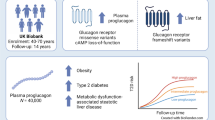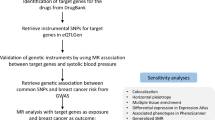Abstract
The leptin (LEP) gene has been considered to be implicated in the development of cancer. However, the results have been inconsistent. In this study, we performed a meta-analysis to clarify the association of LEP rs7799039 variant with colorectal and prostate cancer risk. Published literatures from PubMed and Embase were retrieved. Pooled odds ratio (OR) with 95 % confidence interval (CI) was calculated using fixed or random effects model. A total of five studies (2,596 colorectal cancer cases and 3,240 controls) for association of LEP rs7799039 variant with colorectal cancer, and three studies (1,343 prostate cancer cases and 1,238 controls) for association with prostate cancer were included in the meta-analysis. For colorectal cancer, there was no significant association of LEP rs7799039 variant with this disease under homogeneous co-dominant model (OR = 0.88, 95 % CI = 0.75–1.02), heterogeneous co-dominant model (OR = 1.00, 95 % CI = 0.89–1.13) and dominant model (OR = 0.97, 95 % CI = 0.87–1.08); however, there was a marginal association under recessive model (OR = 0.87, 95 % CI = 0.76–0.99). For prostate cancer, there was significant association of LEP rs7799039 variant with this disease under homogeneous co-dominant model (OR = 1.33, 95 % CI = 1.06–1.67) and recessive model (OR = 1.26, 95 % CI = 1.05–1.51), but not under heterogeneous co-dominant model (OR = 1.24, 95 % CI = 0.87–1.77) and dominant model (OR = 1.30, 95 % CI = 1.84). The present meta-analysis demonstrated that the LEP rs7799039 variant was associated with prostate cancer, but not with colorectal cancer.





Similar content being viewed by others
References
Zhang Y, Proenca R, Maffei M, Barone M, Leopold L, Friedman JM. Positional cloning of the mouse obese gene and its human homologue. Nature. 1994;372:425–32.
Halaas JL, Gajiwala KS, Maffei M, Cohen SL, Chait BT, Rabinowitz D, et al. Weight-reducing effects of the plasma protein encoded by the obese gene. Science. 1995;269:543–6.
Loffreda S, Yang SQ, Lin HZ, Karp CL, Brengman ML, Wang DJ, et al. Leptin regulates proinflammatory immune responses. FASEB J. 1998;12:57–65.
Russo VC, Kobayashi MK, Harris M, Werther GA. Antiapoptotic effects of leptin in human neuroblastoma cells. Endocrinology. 2004;145:4103–12.
Slattery ML, Wolff RK, Herrick J, Caan BJ, Potter JD. Leptin and leptin receptor genotypes and colon cancer: gene-gene and gene-lifestyle interactions. Int J Cancer. 2008;122:1611–7.
Pechlivanis S, Bermejo JL, Pardini B, Naccarati A, Vodickova L, Novotny J, et al. Genetic variation in adipokine genes and risk of colorectal cancer. Eur J Endocrinol. 2009;160:933–40.
Vasků A, Vokurka J, Bienertová-Vasků J. Obesity-related genes variability in Czech patients with sporadic colorectal cancer: preliminary results. Int J Colorectal Dis. 2009;24:289–94.
Tsilidis KK, Helzlsouer KJ, Smith MW, Grinberg V, Hoffman-Bolton J, Clipp SL, et al. Association of common polymorphisms in IL10, and in other genes related to inflammatory response and obesity with colorectal cancer. Cancer Causes Control. 2009;20:1739–51.
Partida-Pérez M, de la Luz A-MM, Peregrina-Sandoval J, Macías-Gómez N, Moreno-Ortiz J, Leal-Ugarte E, et al. Association of LEP and ADIPOQ common variants with colorectal cancer in Mexican patients. Cancer Biomark. 2010;7:117–21.
Ribeiro R, Vasconcelos A, Costa S, Pinto D, Morais A, Oliveira J, et al. Overexpressing leptin genetic polymorphism (−2548 G/A) is associated with susceptibility to prostate cancer and risk of advanced disease. Prostate. 2004;59:268–74.
Moore SC, Leitzmann MF, Albanes D, Weinstein SJ, Snyder K, Virtamo J, et al. Adipokine genes and prostate cancer risk. Int J Cancer. 2009;124:869–76.
Wang MH, Helzlsouer KJ, Smith MW, Hoffman-Bolton JA, Clipp SL, Grinberg V, et al. Association of IL10 and other immune response- and obesity-related genes with prostate cancer in CLUE II. Prostate. 2009;69:874–85.
DerSimonian R, Laird N. Meta-analysis in clinical trials. Control Clin Trials. 1986;7:177–88.
Mantel N, Haenszel W. Statistical aspects of the analysis of data from retrospective studies of disease. J Natl Cancer Inst. 1959;22:719–48.
Begg CB, Mazumdar M. Operating characteristics of a rank correlation test for publication bias. Biometrics. 1994;50:1088–101.
Egger M, Davey Smith G, Schneider M, Minder C. Bias in meta-analysis detected by a simple, graphical test. BMJ. 1997;315:629–34.
Liu L, Zhong R, Wei S, Xiang H, Chen J, Xie D, et al. The leptin gene family and colorectal cancer: interaction with smoking behavior and family history of cancer. PLoS One. 2013;8:e60777.
Hoffstedt J, Eriksson P, Mottagui-Tabar S, Arner P. A polymorphism in the leptin promoter region (−2548 G/A) influences gene expression and adipose tissue secretion of leptin. Horm Metab Res. 2002;34:355–9.
He BS, Pan YQ, Zhang Y, Xu YQ, Wang SK. Effect of LEPR Gln223Arg polymorphism on breast cancer risk in different ethnic populations: a meta-analysis. Mol Biol Rep. 2012;39:3117–22.
Wang LQ, Shen W, Xu L, Chen MB, Gong T, Lu PH, et al. The association between polymorphisms in the leptin receptor gene and risk of breast cancer: a systematic review and pooled analysis. Breast Cancer Res Treat. 2012;136:231–9.
Conflicts of interest
None
Author information
Authors and Affiliations
Corresponding author
Additional information
The Publisher and Editor retract this article in accordance with the recommendations of the Committee on Publication Ethics (COPE). After a thorough investigation we have strong reason to believe that the peer review process was compromised.
An erratum to this article can be found online at http://dx.doi.org/10.1007/s13277-017-5487-6.
About this article
Cite this article
He, J., Xu, G. RETRACTED ARTICLE: LEP gene variant is associated with prostate cancer but not with colorectal cancer. Tumor Biol. 34, 3131–3136 (2013). https://doi.org/10.1007/s13277-013-0881-1
Received:
Accepted:
Published:
Issue Date:
DOI: https://doi.org/10.1007/s13277-013-0881-1




